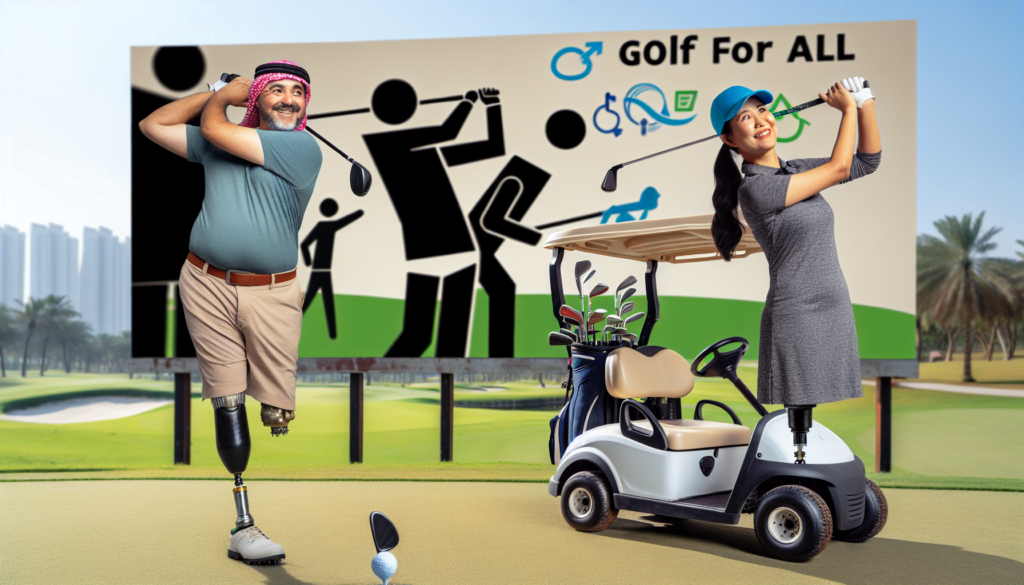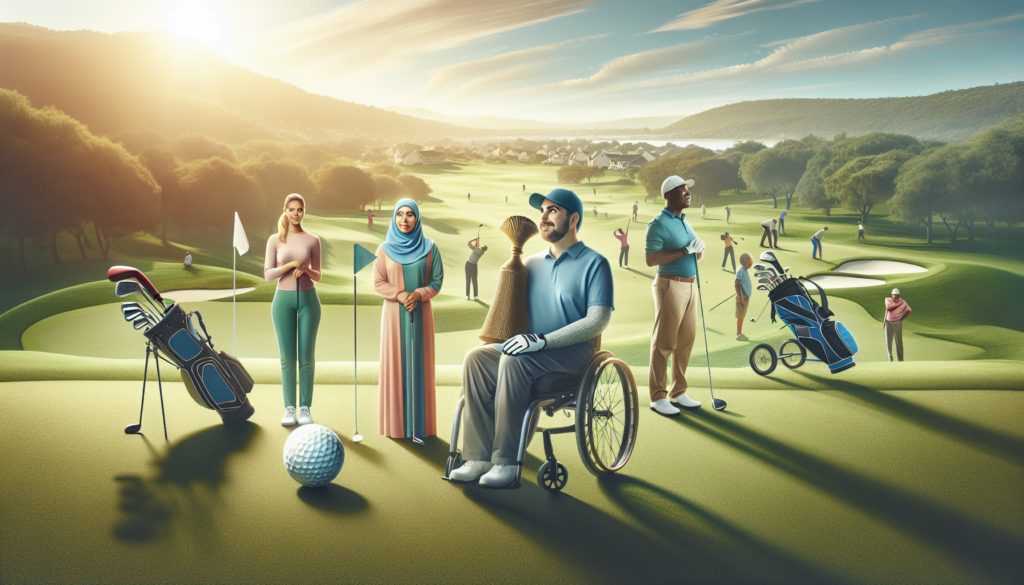Imagine if you could enjoy the game of golf no matter what physical limitations you may have. Well, the good news is that golf can be adapted for players with disabilities, allowing everyone to experience the joy and challenge of this beloved sport. ClubhouseLegends is here to provide all the information and guidance you need to understand how golf can be modified to suit different disabilities. From special equipment and adaptive techniques to training methods that enhance skills, we’ve got you covered. Whether you’re an aspiring golfer or a seasoned player facing new challenges, we’re here to help you navigate the world of accessible golf.

Adapting the Golf Course
Golf courses can be modified to make them more accessible and accommodating for players with disabilities. Modifying the terrain is an essential aspect to consider. This can involve creating smoother and more even surfaces, removing hazards, and ensuring pathways are wide enough for mobility devices. Additionally, installing accessible features such as ramps, handrails, and accessible parking spaces can greatly enhance the experience for players with disabilities. These modifications aim to create an inclusive environment where all golfers can navigate and enjoy the course without limitations.
Adapting Golf Equipment
Adapting golf equipment is crucial in facilitating the participation of players with disabilities. Customized clubs can be designed to suit the specific needs of individuals with physical limitations. These clubs may have modified shaft lengths, grip sizes, or clubhead designs to accommodate different swing styles and abilities. Adaptive aids, such as specialized grips or swing assistive devices, can be used to help players with grip and swing impairments. Additionally, accessible golf carts equipped with ramps or modified controls can enable players with mobility issues to navigate the course comfortably.
Modifying Golf Rules
Modifying golf rules is another way to ensure that players with disabilities can fully engage in the sport. Allowing for accommodations, such as the use of assistive devices or assistants, can create a level playing field for all participants. Alternative scoring systems, such as Stableford or Modified Stableford, can also be implemented to take into account players’ abilities and provide fair competition. Flexible teeing options can be introduced, allowing players to tee off from closer distances based on their specific needs. These rule modifications strive to make golf more inclusive and adaptable to different skill levels and abilities.
Training and Instruction
Specialized coaching programs can be developed to provide targeted training for players with disabilities. These programs aim to address specific challenges and enhance golf skills while keeping individual abilities and needs in mind. Coaches can adapt teaching techniques to suit different learning styles and physical abilities. Instruction can focus on developing adaptive golf skills, such as modified swing techniques or strategies tailored to specific disabilities. By offering comprehensive and tailored training programs, the golf community can ensure that players with disabilities have access to quality instruction and support.

Adaptive Golf Competitions
Creating inclusive tournaments is an integral part of promoting adaptive golf. By organizing tournaments that cater to players with disabilities, the golfing community can provide opportunities for competition and camaraderie. Establishing handicap systems allows players of different abilities to compete on an equal footing. This ensures fair play and encourages participation from individuals with disabilities. Additionally, promoting para-golf events can further raise awareness and showcase the skills and talents of players with disabilities. Through inclusive competitions, the golf community can foster a sense of belonging and inspire others to embrace adaptive golf.
Benefits of Adaptive Golf
Participating in adaptive golf offers numerous benefits, including physical rehabilitation. The physical demands of swinging a golf club and navigating the course can contribute to improved strength, balance, and coordination. These physical benefits can be particularly advantageous for individuals undergoing rehabilitation or living with physical disabilities.
In addition to physical benefits, adaptive golf promotes social inclusion. Playing golf allows individuals to interact with others who share a common interest, fostering a sense of belonging and camaraderie. The golf course provides a space where individuals can connect and build relationships, contributing to improved mental well-being.
Financial Support and Sponsorship
To support the adaptation of golf for players with disabilities, financial support and sponsorship play a crucial role. Accessible golf grants can be sought to fund course modifications, specialized equipment, and coaching programs. Corporate partnerships with organizations that prioritize inclusivity can also provide financial support and resources. Community fundraising initiatives, such as charity golf tournaments or crowdfunding campaigns, can help raise funds to support adaptive golf initiatives. By securing financial support and sponsorship, the golfing community can ensure that adaptive golf programs are sustainable and accessible to all.
Advocacy and Awareness
Advocacy and awareness efforts are essential in promoting inclusive golf. Educating the golf community about the needs and experiences of players with disabilities can help dispel stereotypes and misconceptions. Through initiatives like seminars, workshops, and awareness campaigns, the golfing community can actively promote inclusivity and encourage participation from individuals with disabilities. Collaborating with disability organizations can provide valuable insights and resources to facilitate these efforts. By working together, golfers and disability organizations can create a more inclusive and welcoming golfing community.
Success Stories and Inspirational Players
Highlighting success stories and profiling golfers with disabilities can inspire and motivate others to pursue adaptive golf. Sharing stories of individuals who have overcome challenges and excelled in the sport can break down barriers and challenge perceptions. By showcasing the achievements of these inspirational players, the golfing community can foster a culture of inclusivity and showcase the immense talent present within adaptive golf.
Additional Resources and Support
Accessible golf organizations provide valuable resources and support for players with disabilities. These organizations specialize in promoting adaptive golf and can provide information on accessible courses, equipment, and training programs. Online communities offer opportunities for players to connect, share experiences, and seek advice from others with similar challenges. Training and certification programs can equip coaches and instructors with the necessary skills and knowledge to effectively teach adaptive golf. These resources and support systems ensure that players with disabilities have access to the necessary guidance and information to fully participate in the sport.
In conclusion, adapting golf for players with disabilities involves modifying the golf course, equipment, rules, and training approaches. By creating accessible environments, providing specialized equipment, modifying rules, and offering tailored training and instruction, the golfing community can promote inclusivity and ensure that players with disabilities have equal opportunities to engage in the sport. Adaptive golf competitions, financial support and sponsorship, advocacy and awareness, as well as success stories, further contribute to a supportive and inclusive golfing environment. The physical, social, and mental benefits of adaptive golf make it an incredibly valuable and enriching experience for players with disabilities. With the support of accessible golf organizations, online communities, and training programs, the golfing community can continue to enhance the accessibility and inclusivity of the sport for individuals with disabilities.
